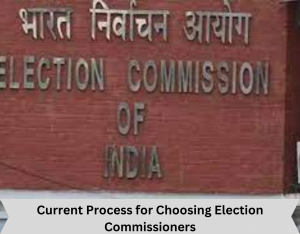ForumIAS announcing GS Foundation Program for UPSC CSE 2025-26 from 27th May. Click Here for more information.
Source: This post has been created based on the article “Explained: The new process for picking Election Commissioners, what led to it” published in “Indian Express” on 8th February 2024.
UPSC Syllabus Topic: GS Paper 2 – Indian Polity – Appointment to various Constitutional posts, powers, functions and responsibilities of various Constitutional Bodies.
News: The article discusses the issues with the earlier process of appointing Election Commissioners and the Supreme Court’s ruling regarding this. It also highlights issues with the current method of appointment. Current Process for Choosing Election Commissioners.
A detailed article on Appointments to the Election Commission can be read here.
Background:
The new Election Commissioner will be picked through a consultative process being adopted for the first time after a Supreme Court verdict and a new law.
What were The Issues with The Earlier Process of Appointing Election Commissioners?
- The power to make appointments rested exclusively with the Executive (the Union government).
- Article 324(2) specifies the President’s role in appointing Election Commissioners, with the caveat that this appointment is subject to any law passed by Parliament. However, governments had not enacted such a law.
Thus, the current appointment system was opaque and raised doubts about the institution’s independence.
What was The Supreme Court’s Ruling Regarding This?
The Court observed that it was evident that the founding fathers of the Constitution did not want the Executive to have exclusive authority in appointing Election Commission members.
It ruled that “the appointment shall be made on the advice of a Committee consisting of the PM, the Leader of the Opposition of the Lok Sabha (or the leader of the largest opposition Party in the Lok Sabha in terms of numerical strength), and the CJI.”
However, the Court was careful to specify that these norms were “subject to any law to be made by Parliament’.
What have been Other Recommendations in This Regard?
1) Dinesh Goswami committee: It had recommended that the President consult the CJI and the Leader of the Opposition, or the leader of the largest Opposition group, for appointing the Chief Election Commissioner. For the other two Election Commissioners, the consultation was to involve the CJI, the Leader of the Opposition, and the Chief Election Commissioner.
2) Law Commission’s 255th report: It suggested that a 3-member collegium or selection committee, comprising the PM, the Leader of the Opposition or the leader of the largest Opposition party in the Lok Sabha, and the CJI should be consulted.
What is The Current Procedure because of The SC Judgment?
The Centre introduced a Bill in Parliament last year which establishes a committee comprising the Prime Minister, the Leader of Opposition in the Lok Sabha, and a Cabinet Minister nominated by the PM.
The selection will be made from 5 names shortlisted by a screening panel headed by the Law Minister and comprising 2 Union secretaries.
Read More UPSC Topics-
What Issues Remain Plague The New Appointment Process?
The appointment process raises concerns regarding its potential to undermine the reforms sought by the Court. For instance, the proposed committee’s composition effectively sidelines the Leader of Opposition, who could be consistently outvoted by the PM and the union minister.
Question for practice:
What are the issues with the current procedure of appointing Election Commissioners in India?





